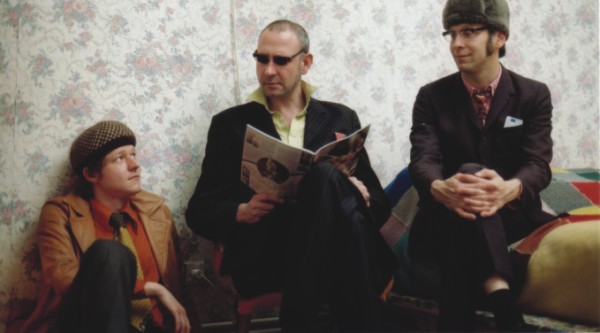Music
Jazzing
Up & Down
A
German trio captivates both the expatriates and the Dhakaites
in an electrifying concert of jazz
Mustafa
Zaman
Jazz is
a kind of music that teases the neuron, at least in a figurative
way. The German trio Der Rote Berliech has proved once again
that jazz is not for the faint-hearted. The fragments of music
that overlap and go to build every piece, as a whole, take one
out on a jaunt with its unexpected ups and downs. The course,
however rough, has its share of smooth, non-toothy moments.
But jazz, as a rule, comes with a strong bite and the trio's
experimental compositions seemed edgier than many purer versions
that come from the other side of the Atlantic nowadays.
On
the evening of January 20, at the Osmani Memorial Hall, the
German musicians swayed the audience, so much so, that the applase
at the end of each piece even made one of the organisers wonder
out loud,"We didn't expect that the audience would be stimulated
the way they were and we also didn't expect to have a full house."
It was Goethe Institut sponsored Jazz evening.
Music crosses
the boundary as easily as narcotic, but surely without ever
causing the harm that results from the abuse of the later. Even
for the listeners in the audience who were unschooled in modern
repertoire, the Avant-garde jazz, as their music has been referred
to in the flyer and during the show, the sound was enlivening.
Anyone with an ear for Police's jazz-tinged post-punk upbeat
forays must have found it easier to get into the vibe of the
trio's repertory in that electrifying evening. With Rudi Mahall
in clarinet, Oliver Steidle in percussion,Möbus's composition
had the potential to leave a conspicuous mark in live performance.
Möbus likes to look at his music as "jazz unbounded
by tradition". "There are listeners who after hearing
our music often say that 'it's not jazz'. This doesn't bother
me, as my influences are varied: from rock, twelve-tone to other
traditional music," he says.
About the
difference between European and the American Jazz, Möbus
points out that it is the freedom with which jazz is handled
in the continent that gives it a different character. As the
band-leader, who composes most of their pieces, Frank Möbus
draws on all the sources that he fancies. "In Europe there
is a bigger space, there is this chance of playing music as
an art form. In America, the place from which Jazz originated,
there is always a constraint as the musicians are tied up with
the hoteliers who tell them what to play." But he also
adds that it is just an example regarding what the artistes
in America have to usually face. "It is the non-cooperation
from the government that makes them suffer. Bush is not willing
to spend on culture. Here, in Europe, there is a lot of money
for artistes and it gives them the freedom to produce work of
their own choice," Möbuscontinues.
The group
came into being in 1992. It was in Nurnberg, Germany, where
the guitar-player Möbus met the bass-clarinet-player, Mahall.
At the onset they hooked up with Marty Cook, an American jazz
trombonist, and bass-player Henning Sieverts and drummer Jim
Black in drum from the New York knitting factory scene.
With this
set-up the group produced their first few CDs. From the early
1990s to 2002, the band has come up with five CDs. The recent
ones among these five, were the work of the three musicians
-- Möbus, Mahall and John Shroder (on drums). But that
set-up has also gone through a change. Oliver Steidel has replaced
the former drummer. And the band is on tour with the new member
for the first time.
As for their
musical taste and creation, Möbus and Mahall have been
the guiding forces behind the group. Their style, now, is termed
as unconventional. Yet, their unconventionality at times makes
the listener feel at home. As their compositions not only dote
on things that have this sense of deja-vu but also course the
listeners through a journey where highs, lows and even intentional
commotion make them all the more enjoyable.
It is Möbus's
second visit to Dhaka. The last visit was with another band
of musicians. Now, with this band of three he is covering the
region. They have 11 concerts in mind, one in Dhaka and seven
in India, two in Pakistan and another one in Sri Lanka. The
trio's visit is being sponsored by the Goethe Institut. Other
than Möbus, Mahall too had the opportunity visit Asia before.
"I have been to Singapore, Philippines and Hong Kong and
many other South Asian regions and had played with other bands,"
he says.
Young Möbus
did a five-year stint as a student at the Berkely College of
Music, Boston. And it was he who chipped in with a few English
words during the concert to let the audience in on a bit of
background knowledge just to throw light on the pieces they
played. But, he too realised that the jagged and disjointed
sounds that make up the ultimate experience is self-explanatory
and need not be translated in words. After all, music is meaningful
not for its interpretations but for sheer the joy of it.

The
unassuming German trio--(L-R) : Oliver, Möbus and Rudi
Copyright
(R) thedailystar.net 2004
|
